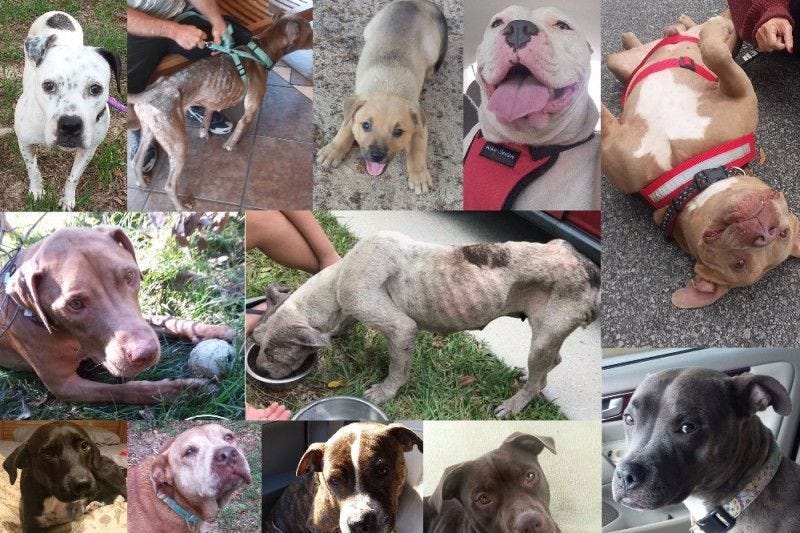![The Mylo Foundation has approximately 35 dogs in foster homes right now. [The Mylo Foundation | Special to the Press Gazette]](http://127.0.0.1/wordpress/wp-content/uploads/2022/01/ghows-DA-625a49d3-6a48-6ae4-e053-0100007f798a-aa347a5e.jpeg)
Editor's Note: This continues our Celebrate Community series on nonprofit organizations that improve Santa Rosa County residents' quality of life.
MILTON — Milton native Patricia Kruger has had a passion for dogs since she was a child, which prompted her to establish a nonprofit organization to help local dogs become healthy and find new homes.
Although the Mylo Foundation was only founded two years ago, Kruger has worked with animals since she was 12 years old. Kruger holds a degree in behavioral psychology, and during her course work she spent a lot of time analyzing the behavior of animals.
The Mylo Foundation is named after her beloved dog whom she adopted from the Santa Rosa County Animal Services shelter in 1983.
“He was the first dog I rescued,” Kruger said. “I volunteered there. Back then they had the gas chamber, and back then it wasn’t something they would think to guard even me from, so I saw the whole [thing]; I saw the truckload of dogs, I saw the whole thing. It really put a big impact on me about the animals and what they go through and what really needs to be done.”
Kruger said she remembers the first time she witnessed this practice of euthanizing animals, and she left the shelter in tears. Use of the gas chamber within animal shelters was banned in Florida in 1993, according to the Humane Society of the United States; however, several states still participate in this method of euthanasia.
“Through that, I was involved in quite a bit of rescues,” Kruger said. “About two years ago, all the rescues I was working with … there were certain dogs that I saw that no one was helping, and [those were] the ones that probably had the most need. So I started the Mylo Foundation specifically to help those dogs — the ones that have no other help.”
The foundation works to help dogs who are older, sick, have behavioral issues or are a certain breed that is more difficult to find a home for.
“Some of them… when they’re at the shelter, they don’t test very well," Kruger said. "When you get them out of the shelter, they actually do a lot better.”
The Mylo Foundation is foster-based, so members bring the dogs into their own homes. According to Kruger, most of the dogs find homes within a couple of months.
“We train them,” Kruger said. “Really, they’re dogs that no one has ever given anything, so you get them into your home and you just give them that consistency of even just food, and it’s amazing how it makes them feel.”
Currently, there are approximately 35 Mylo dogs in different foster homes in the area. The foundation works with Safe Harbor Animal Hospital in Pensacola to provide services for their dogs.
“We rescue mainly from the Baldwin County Animal Shelter in Alabama,” Kruger said. “We partnered with them a couple of years ago, and under the direction of the state manager that they had, we brought that shelter to no-kill, and it stayed no-kill for 22 months.”
The organization receives funds through pledges for specific dogs they plan to rescue from a shelter, regular sponsors, selling T-shirts, raffles and other fundraisers.
On Feb. 3, the Mylo Foundation is holding an adoption event — the Mylo Mardi Gras Ball — at the Islander at Pensacola Beach. The business donated a private party to the foundation.
The Mylo Foundation runs solely on work from volunteers and a board of directors who make decisions for the organization. Kruger said they are always looking for more volunteers, foster homes and people willing to help transport animals to and from veterinarian appointments.
“Once they’re a Mylo dog, it’s always our dog,” Kruger said. “If any time during that dog’s life, the dog has to be returned, it will come to us. We guarantee that any dog we pull will never go back to a shelter. That’s important, because those dogs have never had anyone do that for them, and that’s what they really need.”
The fee to rescue a dog from the Mylo Foundation is $125, which includes spay or neuter, heartworm preventive medication, vaccinations, DNA testing, and for animals who are heartworm-positive, the organization will pay for the treatment until they are negative.
“It’s a really harsh reality, and I don’t think a lot of people know about that reality in shelters,” Kruger said. “That might be the beginning, is just people understanding what the problem is and how to fix it.”




This article originally appeared on Santa Rosa Press Gazette: 'They’re dogs that no one has ever given anything'
